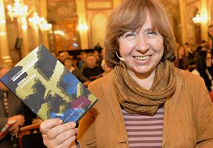Excerpts from the Nobel Prize lecture by Svetlana Alexievich, recipient of the 2015 award in literature, in Stockholm Dec. 7:

[Soviet-era Russian author] Varlam Shalamov once wrote: “I was a participant in the colossal battle, a battle that was lost, for the genuine renewal of humanity.” I reconstruct the history of that battle, its victories and its defeats. The history of how people wanted to build the Heavenly Kingdom on earth. Paradise! The City of the Sun! In the end, all that remained was a sea of blood, millions of ruined human lives. There was a time, however, when no political idea of the 20th century was comparable to communism (or the October Revolution as its symbol), a time when nothing attracted Western intellectuals and people all around the world more powerfully or emotionally. Raymond Aron called the Russian Revolution the “opium of intellectuals.” But the idea of communism is at least two thousand years old. We can find it in Plato’s teachings about an ideal, correct state; in Aristophanes’ dreams about a time when “everything will belong to everyone.” . . . In Thomas More and Tommaso Campanella . . . Later in Saint-Simon, Fourier and Robert Owen. There is something in the Russian spirit that compels it to try to turn these dreams into reality.
Twenty years ago, we bid farewell to the “Red Empire” of the Soviets with curses and tears. We can now look at that past more calmly, as an historical experiment. This is important, because arguments about socialism have not died down. A new generation has grown up with a different picture of the world, but many young people are reading Marx and Lenin again. In Russian towns there are new museums dedicated to Stalin, and new monuments have been erected to him.
The “Red Empire” is gone, but the “Red Man,” homo sovieticus, remains. He endures.
My father died recently. He believed in communism to the end. He kept his party membership card. I can’t bring myself to use the word “sovok,” that derogatory epithet for the Soviet mentality, because then I would have to apply it my father and others close to me, my friends. They all come from the same place—socialism. There are many idealists among them. Romantics. Today they are sometimes called slavery romantics. Slaves of utopia.
[ Full lecture ]
* Svetlana Alexandrovna Alexievich (born 31 May 1948 in Stanislaviv) is a Belarusian investigative journalist and non-fiction prose writer who writes in Russian. She has explored conflict and its aftermath for more than 30 years, interviewing thousands in a quest to ‘get the closest possible approximation to real life’. She was persecuted by Alexander Lukashenko’s dictatorial regime, which made her leave Belarus in 2000. She went on to live in Paris, Gothenburg and Berlin, and could only return to Minsk in 2011.
Comments powered by CComment